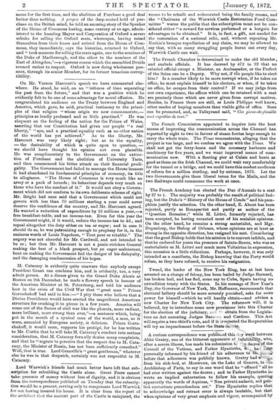On Mr. Vernon Harcourt's speech we have commented else- where.
He stood, he said, on an " isthmus of time separating the past from the future," and that was a position which he evidently felt to be one of some advantage for moral effusion. He congratulated his audience on the Treaty between England and America, which gave, be said, practical testimony to the princi- ples of that religion " whose origin we now commemorate,— principles so loudly professed and so little practised." He was eloquent on the feeling of the nation for the Prince of Wales, asserting that our Constitution had given our people " a real liberty," " aye, and a practical equality such as no other nation of the world has yet achieved." As to the liberty, Mr. Harcourt was very likely right ; but as to the equality, — the desirability of which is quite open to question, we should have thought his opinion not even plausible. He was complimentary to the Government on the extinc- tion of Purchase and the abolition of University Tests, and then commenced his bitter attack on their financial prodi- gality. The Government had failed to manage the House because it had abandoned its fundamental principles of economy, its title to allegiance. "The House of Commons is very much like an army or a pack of hounds ; its behaviour depends very much on those who have the conduct of it." It would not obey a Govern- ment which did not conform to its own deliberate scheme of right. Mr. Bright had once said that a Government which could not govern with less than 70 millions sterling a year could never
_ deserve the confidence of the country, and Mr. Harcourt agreed. He wanted a reduction of expenditure by 16 millions a year,—a free breakfast-table, and no income-tax. Even for this year the Government might, if it would, reduce the income-tax to 4d., and repeal altogether the duty either on tea or sugar ; and in case it should do so, he was patronizing enough to prophesy for it, in the ominous words of Louis Napoleon, " Tout petit se retablir." The augury was not cheerful for Mr. Cardwell, and not intended to be so ; but then Mr. Harcourt is not a panic-stricken General making the best of a black prospect, but an eager malcontent, bent on making the Government feel the danger of his disloyalty, and the damaging condescension of his hopes.










































 Previous page
Previous page